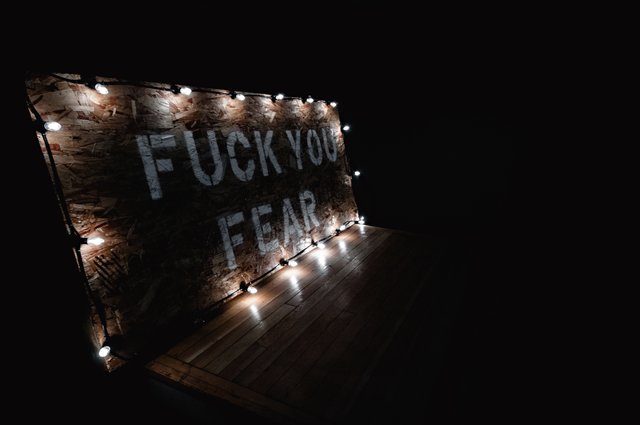Fail your way to the top!

The fear of failure
I think everyone, to a certain degree has a fear of failing. This fear can be pretty benign to where you can just chalk it up to "oh well" and try again to having a fully fledged phobia of failure (Atychiphobia). This fear seems rather illogical when you think about it since failure is baked into all of us. On a personal level, it's too easy sometimes to be my worst critic when I fail at something. However a good thing I remember that this criticism is often not constructive and can lead to beating myself up over nothing. So in these situations it is important to apply the right amount of criticism and focus not giving up and the lesson to be learned, not how stupid it is for making a mistake.
There are also societal pressures that are associated with failure that contribute to the fear of failing. Many of our societal institutions view failing as one of the worst things that you can do. For example our broken education system labels children who do not perform to expectation as failures and intentionally do not invest in these students. Rather than looking into environmental factors, the curriculum (Common Core) or the teachers as potential contributing factors, the failure is entirely thrust onto the student.
Another example of this is the over bearing nature of some parents who try to live vicariously through their children. This can often put way too much pressure on the child to meet their extremely high expectations, but these are whole other topics on their own that we will not get into here. Viewing failure as a negative thing only further promotes this fear and tries to prevent any type of learning from the failure by avoidance, essentially robbing the person of the benefits of the failure. This fear for a lot of people prevents them from even attempting a feat. If you do not try, you are guaranteed to NEVER benefit.
What is the purpose of failing?

Put simply, the whole purpose of failure is to teach you something that will help you grow. They are opportunities to perform introspection, which is a very useful psychological process to analyze your thoughts and feelings on the failure to understand it's purpose and the lesson that is trying to be communicated to you. Without failure we do not get better as people. We do not sharpen our tools and revise our strategies. Failure is a crucial learning tool if you let it be.
Depending what you are trying to achieve, you will probably fail at least one or two times and maybe even twenty to thirty times before you start seeing some success. If you want it bad enough, you need to keep trying no matter what. You cannot leave room in your mind that giving up is an option. As long as you don't give up, persistence alone will get you 80% of the way there. The other 20% might be harder for some people or might actually be easier. This is the part that requires the introspection that I talked about earlier to really look at the failure objectively and adjust your strategy accordingly.
Fail your way to the top!

I developed a mindset from a very early age that quitting or giving up was never an option. From this I also developed a very strong will power, and a knack to pursue challenges. I thought that if I am not challenging myself, I am not growing as a person. This is a good thing but only up to a point. Because at what point will you release yourself from things that don't work? So I also had to learn to draw a line in the sand for myself, otherwise fall victim to the sunk cost fallacy. Knowing when to strategically retreat is crucial to success as well. Since through failure became the primary way I found success, I developed a saying for myself: "I will fail my way to the top". I have already created a lot of success in my life academically, professionally, personally, spiritually and don't plan on stopping anytime soon! I owe much of it to my outlook on failure and using all of these tools effectively.
In summary, here are the important things to remember.
Persistence gets you 80% of the way there, so don't give up!
Learn from your mistakes. Do introspection on the failure and learn the lesson being presented.
Learn how to incorporate strategic retreat so if something doesn't work, adjust your strategy.
Fail your way to the top! Don't be a stranger to failure. Get to know to know it well. The more you do, the more you will grow and with each failure you will be one step closer to your goal.
I hope you have found this helpful and will be able to / already incorporate these tools into your life.
Love to all.
Photo Credits
Fuck you Fear - Scott Webb
Toddler by stairs - Mikito Tateisi
Boy on ladder - Samuel Zeller
This is similar to the benefit I find in being wrong. I love to find out I'm wrong about something because then I can make a correction and be more right. I learn more by being wrong, and I love to learn.
Absolutely! Failure is probably our greatest teacher and the one we shy away from the most. I would really like to see society to start view this differently. I think that if you haven't failed in something you are exploring, then you aren't trying hard enough.
Thanks for the comment!
Congratulations @dividebyzero! You have completed the following achievement on the Steem blockchain and have been rewarded with new badge(s) :
You can view your badges on your Steem Board and compare to others on the Steem Ranking
If you no longer want to receive notifications, reply to this comment with the word
STOPTo support your work, I also upvoted your post!
Do not miss the last post from @steemitboard:
Thanks!